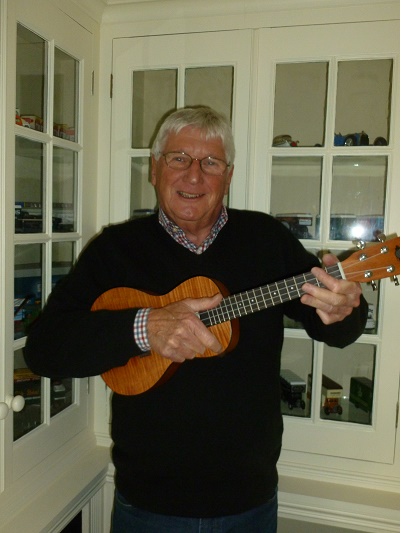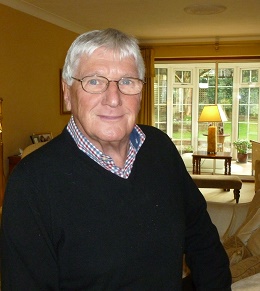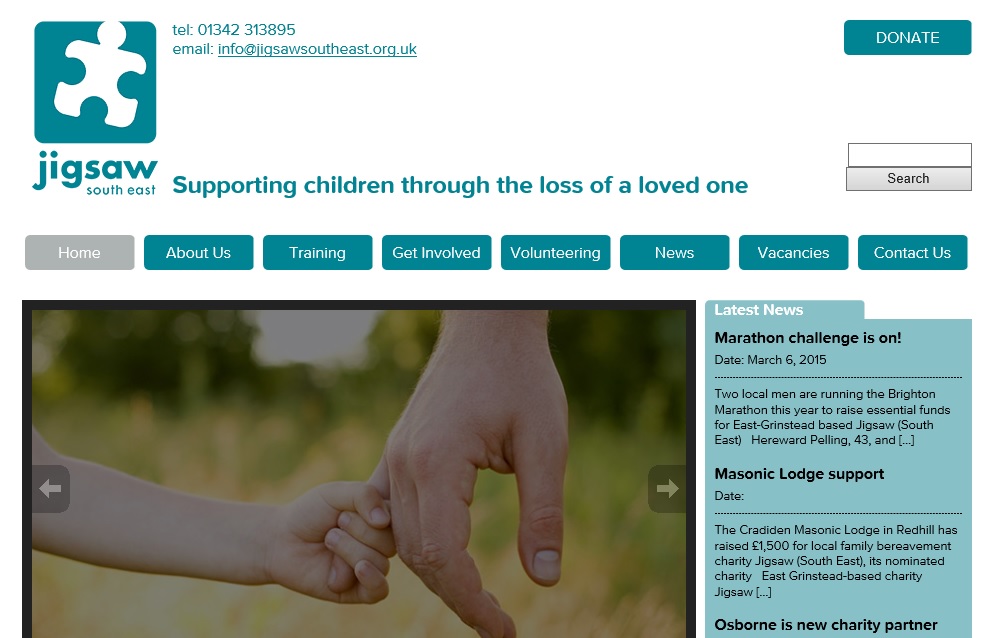An interview with Tony Allen, by Steve Jordan

Tony Allen was one of a small team of revolutionaries who, in the 1970s, transformed the way the moving industry uses and buys packing materials, etc. At 73 he’s been retired seven years, but he’s still a busy man. One of his many joys is walking; in fact he’s writing a book entitled Walking with Zac in which he tells of his thoughts and conversations while out with his daughter’s border collie. I went along to eavesdrop.
It was raining heavily when I arrived at Tony and Jan’s house. But although the weather was cold the welcome was warm: Tony standing at the door even before the car’s engine had stopped spinning; and Jan closing down a phone conversation to give me a hug. I have known them both for a long time and it was great to see them again. This, I thought to myself, I am going to enjoy.
Tony Allen is a man of many talents. He is good at business; persuasive; a brilliant public speaker and raconteur with an equally highly developed, and rare, ability to listen; he’s as interested as he is interesting; a comic; a naturally gifted musician; and now, it seems, he’s kind to animals too. If cloning were legal there would be a clamour to have him moved up the queue.
Music was one of his early passions. As a child he taught himself to play the piano and can get a decent tune out of most instruments. He is one of those lucky people who can play any tune in his head, without music, and loves to do it. “Music has always been important,” he said. “It’s a good means of communication.”
 He played tea chest base in a skiffle group called The Vampires while at school, some of whom went on to fame and a rock-and-roll lifestyle in a band called Johnny Kidd and the Pirates who had a No. 1 hit with Shakin’ All Over in August 1960. Tony didn’t fancy a life on the road and he’d met Jan by this time anyway, so he chose a proper job instead. He still plays ukulele with his mate Barry from those days though.
He played tea chest base in a skiffle group called The Vampires while at school, some of whom went on to fame and a rock-and-roll lifestyle in a band called Johnny Kidd and the Pirates who had a No. 1 hit with Shakin’ All Over in August 1960. Tony didn’t fancy a life on the road and he’d met Jan by this time anyway, so he chose a proper job instead. He still plays ukulele with his mate Barry from those days though.
The executive life
Tony’s entry into the packaging industry was unconventional, but typical of him. He worked for Unilever for a time who sponsored him to do a business communication and marketing degree at the University College London (UCL). “Marketing was something that very few people had heard of in those days,” he explained. “I learned a few buzz words which stood me in good stead for a time.” He ended up working for a large paper manufacturer which was owned by the Swedish government. By 30 he was UK sales manager.
“One day I was called into the chairman’s office,” said Tony with his tell-tale glinting eye. He was being promoted to European sales director with a great salary, a lavish expense account, an oak panelled office, and a non-contributory pension. Then came the ultimate executive perk. “He opened up his right-hand drawer and produced a key. I remember the sun reflecting off the green agate on the key fob as he gave it to me.” It was the key to the executive toilet; according to Tony an Aladdin’s cave with perfume and showers and concealed lighting. “It was about then that I decided to leave. It just wasn’t me so I left in a final flush!”
The idea
That’s when the idea hit. He realised that there were plenty of co mpanies that needed cardboard cartons, but in quantities much smaller than manufacturers wanted to supply. “So Jan and I set up a company called Challenge Packaging. We worked from the back bedroom and were perfectly content.” With two children at home, Simon (7) and Jane (4) it was a big risk.
mpanies that needed cardboard cartons, but in quantities much smaller than manufacturers wanted to supply. “So Jan and I set up a company called Challenge Packaging. We worked from the back bedroom and were perfectly content.” With two children at home, Simon (7) and Jane (4) it was a big risk.
To get the business started they chose 20 different sizes of boxes, bought 2,000 of each, then sold them in smaller batches to whoever would buy. The business worked. One day he made a cold call on Bert Broster at Overs of Camberley. Tony knew there was a potential market with moving companies to replace the ungainly tea chest but had no idea how big it might become. It was only the very large companies who could afford to buy in bulk. “I told Bert that if we could get a few companies to club together to buy around 2,500 boxes between them I thought I could make it work.” He did and it did work. One of those initial companies was Trenchards of Bournemouth.
BAR Services
David Trenchard, who was working in the family business at the time and would later go on to take over Leatherbarrows, was caught by the idea. He and a number of others were members of a study group which had been created to investigate the potential for bulk purchasing. He asked Tony to a meeting with Joe Luxford, Derek Blatchford and himself to talk about the possibilities. Between them they put together a proposal to BAR showing how the Association could take advantage of the purchasing power of its members. Tony presented the concept at a BAR conference. “BAR thought it was a good idea but was not in a position to fund it,” said Tony. “So David, Joe and Derek put their own reputations behind it. BAR allowed it to be set up and gave it their support and a limited company was formed. Jan and I got the job of running it.” BAR Services was born in 1977 as a not-for-profit organisation and has been self-supporting ever since. Shares in the company were initially held in trust on behalf of participating members.
David, Joe and Derek and a whole host of directors and members came up with a seemingly endless flow of ideas and Colin Quarrington, BAR’s PR consultant at the time, was a great help with his promotional expertise. Hugh Wilson, Brian Mitchell and later Robert Syers, consecutive BAR general secretaries, were very supportive. It was a symbiotic relationship. BAR subsequently received a transfer of the shares in BAR Services making it a wholly owned subsidiary.
“We introduced lots of products that were virtually unheard of at that time,” said Tony. “Mirror packs, wardrobe cartons, paper blankets, were all developed on the request of members.” BAR Services was the ultimate marketing organisation: listening to customers and developing products to meet their needs. BAR Services also developed the concept of modular cartons that would fit together perfectly to make the best use of space in vehicles and shipping containers. “Ted Philp from Pickfords did a lot of work to help us decide what the sizes should be.” Own brand cartons were also rare until the buying power of BAR Services made them attainable for everyone. The industry could now move forward. The days of tea chests and old blankets were over.
Making it work
Tony and Jan had, by accident really, fallen into an industry that would give them a good living, many friends and tremendous joy. Once you are in it, you don’t want to leave. Tracey Boisvert was BAR Services’ first employee: she still works there. Miranda Hyder and Ali Cowie who run the business now, have been there almost as long. Jane Treharne, their daughter (and Zac’s mum) has also been a long serving employee. It is, perhaps, this family feel that keeps the business close to the heart of the industry. Even the BAR Services chairmen had a habit of sticking around in their voluntary roles. “Since we started there have only been five chairmen: David Trenchard, Geoff Upsdell, Peter Barrett, Anthony Robinson and John Luxford,” said Tony. “It’s just a great organisation. Chairman and directors give their time entirely free of charge. And it never ceases to amaze me how they are prepared to share their own best ideas for the good of the industry.”
Tony used his colourful personality to promote BAR Services in a variety of, sometimes unconventional, ways. He was always first on stage to volunteer for a presentation or to do something silly if necessary. BAR conferences in those days were, perhaps, less serious than they are now with a regular diet of fancy dress parties, sing songs, games and even stage plays. The business got done, but a laugh was never far away. Wherever there was fun, Tony was in the thick of it.
He will tell you, with the slightest provocation, of the memorable nonsense of which he was frequently part. The launch of a new bee logo for BAR Services was one such example. “I shall never forget Joe Luxford walking into the BAR conference carrying a box to Arthur Askey singing The Bee Song. It was hilarious and got the message across too.”
There were many more: when the lounge bar closed and both Tony and the grand piano he was playing were carried out so he could continue; the presentation he made when the projectionist dozed off and he had to ad lib; playing blues with the saxophonists from the Edwin Starr Band in Jersey long after the cabaret had finished; the game of truth and lies he chaired that went completely wrong bringing hoots of laughter from the audience; and the day when the band didn’t turn up at all so he, Tony Richman and a few other willing helpers took to the stage and kept the party rocking. “One of my favourites was when I made a presentation and invited my guest to join me. Reg Allen (Harrow Green) then sat on the stage wearing a parrot’s outfit, nodding and gesticulating appropriately. I explained that there had been a misunderstanding. I had asked to be accompanied by the then BAR Services chairman Peter Barratt and not Peter Parrott! I then continued to give my speech seemingly unperturbed. Very silly, but funny.”
“BAR is like a village,” said Tony. “You put a foot wrong and it goes all around. How I got through without too much drama I don’t know.”
Retirement
Tony retired in 2007, when he still loved the business. Why retire? “There comes a time when an old codger becomes a brake on a company.” His retirement came as no surprise to the rest of the team. He had told them five years before when he would step down. “If people see you as a log jam they feel they have nowhere to go,” he explained. “They knew when I was going so could start thinking about how they would continue. Then people find their own level. They were most capable of taking over and I am delighted at what they have achieved since.”
Now he is as busy as he ever was, but doing things differently. He plays the ukulele, works for a local charity called ‘Jigsaw South East’ that works with bereaved children; has a football team of grand and great grandchildren, and spends a lot more time with Jan, sometimes at their place in Portugal.
Oh yes! And he walks very long distances with Zac. I can’t wait to read the book.
Editor’s Note:
If you would like to hear more from Tony Allen, take a look at his new regular feature in The Mover: ‘And finally …’ page 46, or click here.
 Jigsaw South East
Jigsaw South East
Jigsaw is a charity working to support children and young people through trauma, loss and bereavement. It brings them together especially when they feel alone and different, so that by sharing their experiences they can develop ways to move forward in their lives. The charity aims to give young people a voice, empowering them to make their own decisions about their lives. It helps young people to express their views about local, regional and national policies and, in doing so, improve their own lives.
If you would like to join Tony Allen in supporting Jigsaw take a look at www.jigsawsoutheast.org.uk
Click here to view the next Editor's pick.